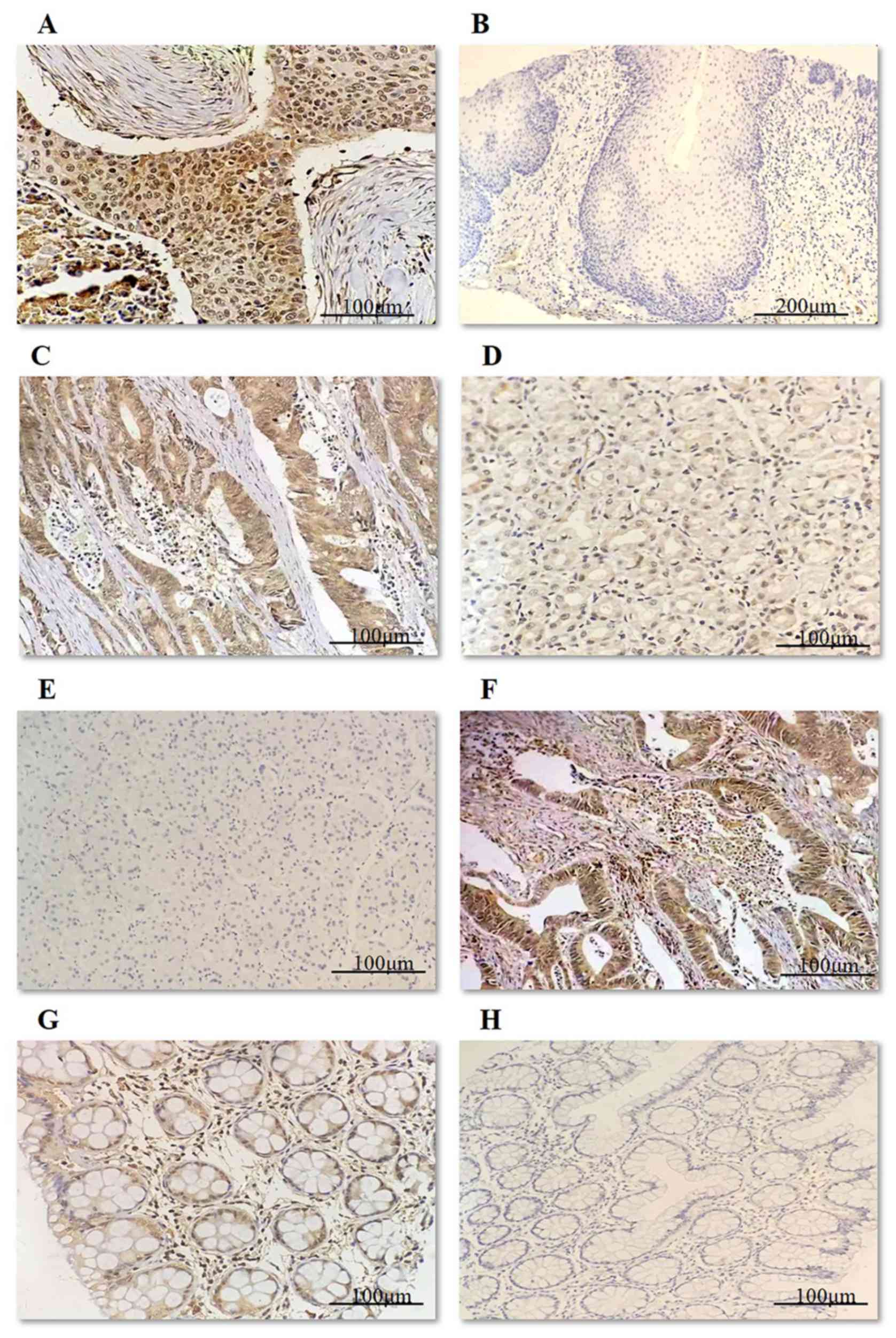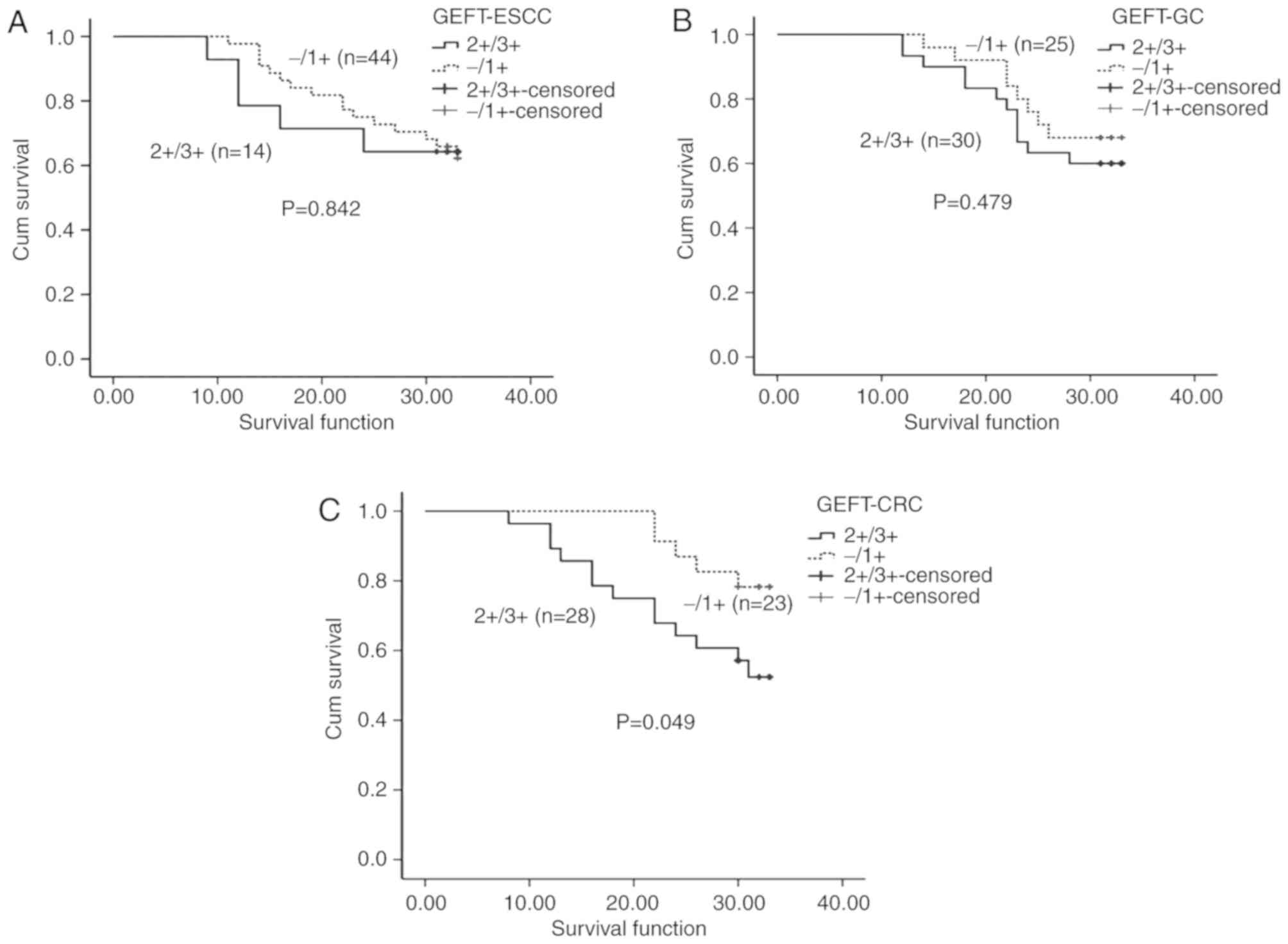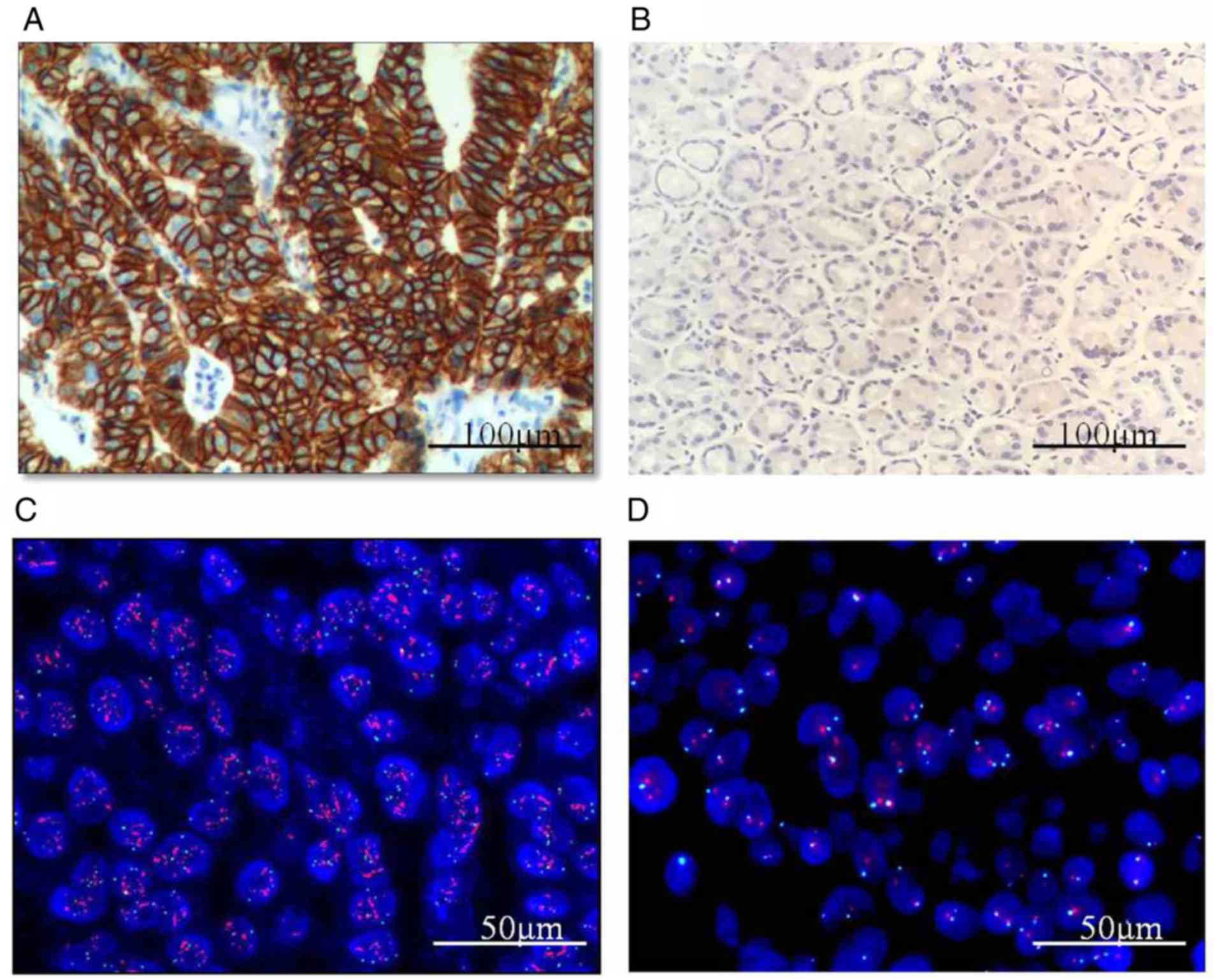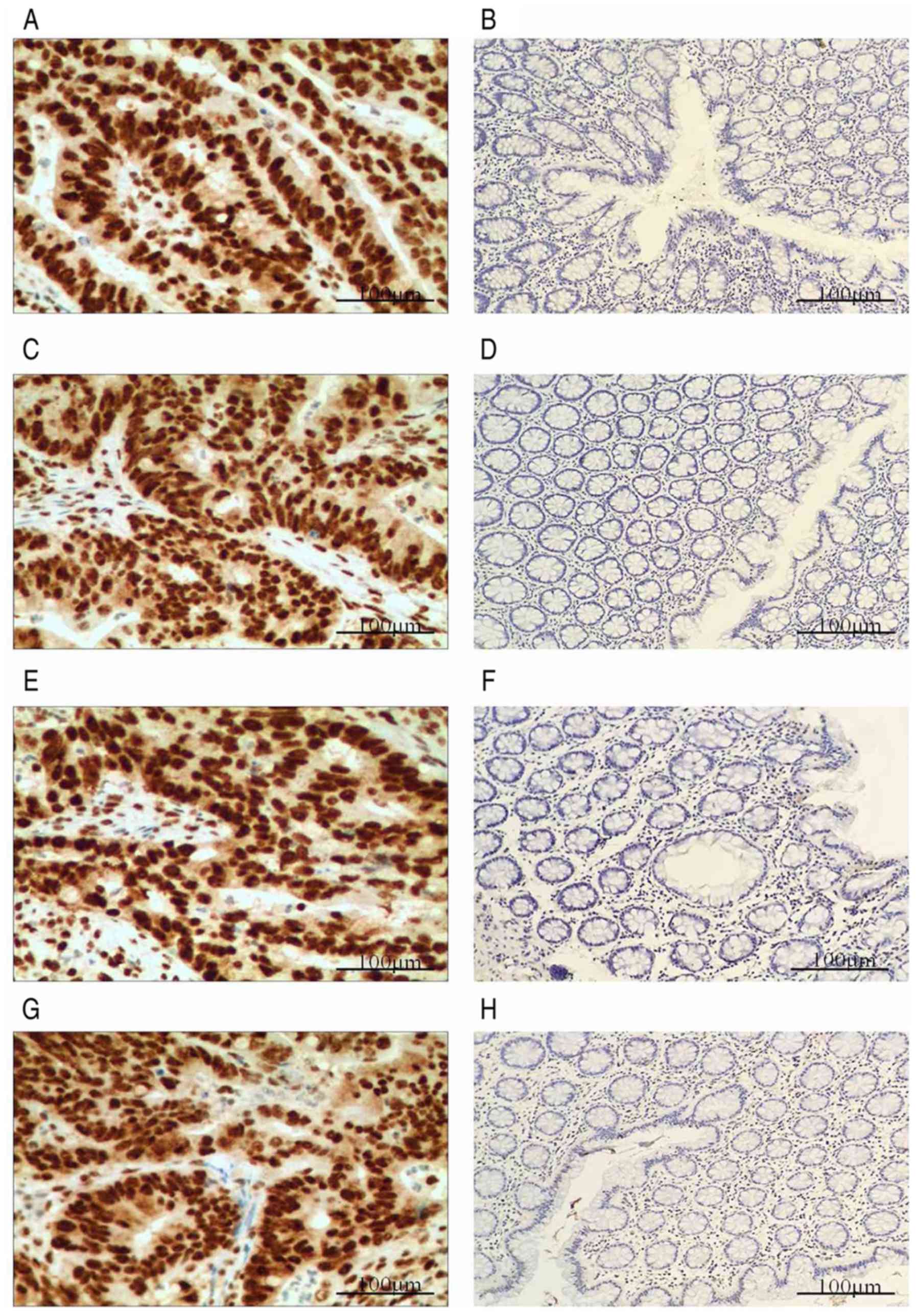|
1
|
Bryan B, Kumar V, Stafford LJ, Cai Y, Wu G
and Liu M: GEFT, a Rho family guanine nucleotide exchange factor,
regulates neurite outgrowth and dendritic spine formation. J Biol
Chem. 279:45824–45832. 2004. View Article : Google Scholar : PubMed/NCBI
|
|
2
|
Bryan BA, Mitchell DC, Zhao L, Ma W,
Stafford LJ, Teng BB and Liu M: Modulation of muscle regeneration,
myogenesis, and adipogenesis by the Rho family guanine nucleotide
exchange factor GEFT. Mol Cell Biol. 25:11089–11101. 2005.
View Article : Google Scholar : PubMed/NCBI
|
|
3
|
Guo X, Stafford LJ, Bryan B, Xia C, Ma W,
Wu X, Liu D, Songyang Z and Liu M: A Rac/Cdc42-specific exchange
factor, GEFT, induces cell proliferation, transformation, and
migration. J Biol Chem. 278:13207–13215. 2003. View Article : Google Scholar : PubMed/NCBI
|
|
4
|
Paulson V, Chandler G, Rakheja D, Galindo
RL, Wilson K, Amatruda JF and Cameron S: High-resolution array CGH
identifies common mechanisms that drive embryonal rhabdomyosarcoma
pathogenesis. Genes Chromosomes Cancer. 50:397–408. 2011.
View Article : Google Scholar : PubMed/NCBI
|
|
5
|
Liu C, Li D, Hu J, Jiang J, Zhang W, Chen
Y, Cui X, Qi Y, Zou H, Zhang W and Li F: Chromosomal and genetic
imbalances in Chinese patients with rhabdomyosarcoma detected by
high-resolution array comparative genomic hybridization. Int J Clin
Exp Pathol. 7:690–698. 2014.PubMed/NCBI
|
|
6
|
Sun C, Liu C, Li S, Li H, Wang Y, Xie Y,
Li B, Cui X, Chen Y, Zhang W and Li F: Overexpression of GEFT, a
Rho family guanine nucleotide exchange factor, predicts poor
prognosis in patients with rhabdomyosarcoma. Int J Clin Exp Pathol.
7:1606–1615. 2014.PubMed/NCBI
|
|
7
|
Lutz S, Freichel-Blomquist A, Rumenapp U,
Schmidt M, Jakobs KH and Wieland T: p63RhoGEF and GEFT are
Rho-specific guanine nucleotide exchange factors encoded by the
same gene. Naunyn Schmiedebergs Arch Pharmacol. 369:540–546. 2004.
View Article : Google Scholar : PubMed/NCBI
|
|
8
|
Tang X, Jin R, Qu G, Wang X, Li Z, Yuan Z,
Zhao C, Siwko S, Shi T, Wang P, et al: GPR116, an adhesion
G-protein-coupled receptor, promotes breast cancer metastasis via
the Galphaq-p63RhoGEF-Rho GTPase pathway. Cancer Res. 73:6206–6218.
2013. View Article : Google Scholar : PubMed/NCBI
|
|
9
|
Hayashi A, Hiatari R, Tsuji T, Ohashi K
and Mizuno K: p63RhoGEF-mediated formation of a single polarized
lamellipodium is required for chemotactic migration in breast
carcinoma cells. FEBS Lett. 587:698–705. 2013. View Article : Google Scholar : PubMed/NCBI
|
|
10
|
Bryan BA, Cai Y and Liu M: The Rho-family
guanine nucleotide exchange factor GEFT enhances retinoic acid- and
cAMP-induced neurite outgrowth. J Neurosci Res. 83:1151–1159. 2006.
View Article : Google Scholar : PubMed/NCBI
|
|
11
|
Siegel RL, Miller KD and Jemal A: Cancer
statistics, 2018. CA Cancer J Clin. 68:7–30. 2018. View Article : Google Scholar : PubMed/NCBI
|
|
12
|
Sjoquist KM, Burmeister BH, Smithers BM,
Zalcberg JR, Simes RJ, Barbour A and Gebski V; Australasian
Gastro-Intestinal Trials Group, : Survival after neoadjuvant
chemotherapy or chemoradiotherapy for resectable oesophageal
carcinoma: An updated meta-analysis. Lancet Oncol. 12:681–692.
2011. View Article : Google Scholar : PubMed/NCBI
|
|
13
|
Pennathur A, Gibson MK, Jobe BA and
Luketich JD: Oesophageal carcinoma. Lancet. 381:400–412. 2013.
View Article : Google Scholar : PubMed/NCBI
|
|
14
|
Hadi AA, Hindawi AE, Hareedy A, Khalil H,
Ashiry RA, Elia S, Sadek A, Magdy M, Atta R, Anas A, et al:
Her2/neu protein expression and oncogene amplification in gastric
carcinoma with clinico-pathological correlation in egyptian
patients. Open Access Maced J Med Sci. 4:535–542. 2016. View Article : Google Scholar : PubMed/NCBI
|
|
15
|
Moore MA, Eser S, Igisinov N, Igisinov S,
Mohagheghi MA, Mousavi-Jarrahi A, Ozentürk G, Soipova M, Tuncer M
and Sobue T: Cancer epidemiology and control in North-Western and
Central Asia-past, present and future. Asian Pac J Cancer Prev. 11
(Suppl 2):S17–S32. 2010.
|
|
16
|
Hsu JT, Chen TC, Tseng JH, Chiu CT, Liu
KH, Yeh CN, Hwang TL, Jan YY and Yeh TS: Impact of HER-2
overexpression/amplification on the prognosis of gastric cancer
patients undergoing resection: A single-center study of 1,036
patients. Oncologist. 16:1706–1713. 2011. View Article : Google Scholar : PubMed/NCBI
|
|
17
|
Sheng WQ, Huang D, Ying JM, Lu N, Wu HM,
Liu YH, Liu JP, Bu H, Zhou XY and Du X: HER2 status in gastric
cancers: A retrospective analysis from four Chinese representative
clinical centers and assessment of its prognostic significance. Ann
Oncol. 24:2360–2364. 2013. View Article : Google Scholar : PubMed/NCBI
|
|
18
|
Bang YJ, Van Cutsem E, Feyereislova A,
Chung HC, Shen L, Sawaki A, Lordick F, Ohtsu A, Omuro Y, Satoh T,
et al: Trastuzumab in combination with chemotherapy versus
chemotherapy alone for treatment of HER2-positive advanced gastric
or gastro-oesophageal junction cancer (ToGA): A phase 3,
open-label, randomised controlled trial. Lancet. 376:687–697. 2010.
View Article : Google Scholar : PubMed/NCBI
|
|
19
|
Ferlay J, Soerjomataram I, Dikshit R, Eser
S, Mathers C, Rebelo M, Parkin DM, Forman D and Bray F: Cancer
incidence and mortality worldwide: Sources, methods and major
patterns in GLOBOCAN 2012. Int J Cancer. 136:E359–E386. 2015.
View Article : Google Scholar : PubMed/NCBI
|
|
20
|
Kriegl L: In situ analyses of molecular
mechanisms of colorectal carcinogenesis. Pathologe. 34 (Suppl
2):S269–S273. 2013.(In German). View Article : Google Scholar
|
|
21
|
Zhang X and Li J: Era of universal testing
of microsatellite instability in colorectal cancer. World J
Gastrointest Oncol. 5:12–19. 2013. View Article : Google Scholar : PubMed/NCBI
|
|
22
|
Boland CR and Goel A: Microsatellite
instability in colorectal cancer. Gastroenterology.
138:2073–2087.e3. 2010. View Article : Google Scholar : PubMed/NCBI
|
|
23
|
Yamamoto H and Imai K: Microsatellite
instability: An update. Arch Toxicol. 89:899–921. 2015. View Article : Google Scholar : PubMed/NCBI
|
|
24
|
Peltomäki P, Lothe RA, Aaltonen LA,
Pylkkänen L, Nyström-Lahti M, Seruca R, David L, Holm R, Ryberg D,
Haugen A, et al: Microsatellite instability is associated with
tumors that characterize the hereditary non-polyposis colorectal
carcinoma syndrome. Cancer Res. 53:5853–5855. 1993.PubMed/NCBI
|
|
25
|
Herman JG, Umar A, Polyak K, Graff JR,
Ahuja N, Issa JP, Markowitz S, Willson JK, Hamilton SR, Kinzler KW,
et al: Incidence and functional consequences of hMLH1 promoter
hypermethylation in colorectal carcinoma. Proc Natl Acad Sci USA.
95:6870–6875. 1998. View Article : Google Scholar : PubMed/NCBI
|
|
26
|
Hampel H, Frankel WL, Martin E, Arnold M,
Khanduja K, Kuebler P, Clendenning M, Sotamaa K, Prior T, Westman
JA, et al: Feasibility of screening for Lynch syndrome among
patients with colorectal cancer. J Clin Oncol. 26:5783–5788. 2008.
View Article : Google Scholar : PubMed/NCBI
|
|
27
|
Vaughn CP, Zobell SD, Furtado LV, Baker CL
and Samowitz WS: Frequency of KRAS, BRAF, and NRAS mutations in
colorectal cancer. Genes Chromosomes Cancer. 50:307–312. 2011.
View Article : Google Scholar : PubMed/NCBI
|
|
28
|
Amado RG, Wolf M, Peeters M, Van Cutsem E,
Siena S, Freeman DJ, Juan T, Sikorski R, Suggs S, Radinsky R, et
al: Wild-type KRAS is required for panitumumab efficacy in patients
with metastatic colorectal cancer. J Clin Oncol. 26:1626–1634.
2008. View Article : Google Scholar : PubMed/NCBI
|
|
29
|
Lièvre A, Bachet JB, Le Corre D, Boige V,
Landi B, Emile JF, Côté JF, Tomasic G, Penna C, Ducreux M, et al:
KRAS mutation status is predictive of response to cetuximab therapy
in colorectal cancer. Cancer Res. 66:3992–3995. 2006. View Article : Google Scholar : PubMed/NCBI
|
|
30
|
Sorich MJ, Wiese MD, Rowland A,
Kichenadasse G, McKinnon RA and Karapetis CS: Extended RAS
mutations and anti-EGFR monoclonal antibody survival benefit in
metastatic colorectal cancer: A meta-analysis of randomized,
controlled trials. Ann Oncol. 26:13–21. 2015. View Article : Google Scholar : PubMed/NCBI
|
|
31
|
Edge SB and Compton CC: The American Joint
Committee on Cancer: The 7th edition of the AJCC cancer staging
manual and the future of TNM. Ann Surg Oncol. 17:1471–1474. 2010.
View Article : Google Scholar : PubMed/NCBI
|
|
32
|
Hofmann M, Stoss O, Shi D, Büttner R, van
de Vijver M, Kim W, Ochiai A, Rüschoff J and Henkel T: Assessment
of a HER2 scoring system for gastric cancer: Results from a
validation study. Histopathology. 52:797–805. 2008. View Article : Google Scholar : PubMed/NCBI
|
|
33
|
Boland CR, Thibodeau SN, Hamilton SR,
Sidransky D, Eshleman JR, Burt RW, Meltzer SJ, Rodriguez-Bigas MA,
Fodde R, Ranzani GN and Srivastava S: A National Cancer Institute
Workshop on Microsatellite Instability for cancer detection and
familial predisposition: Development of international criteria for
the determination of microsatellite instability in colorectal
cancer. Cancer Res. 58:5248–5257. 1998.PubMed/NCBI
|
|
34
|
Fukata M, Nakagawa M and Kaibuchi K: Roles
of Rho-family GTPases in cell polarisation and directional
migration. Curr Opin Cell Biol. 15:590–597. 2003. View Article : Google Scholar : PubMed/NCBI
|
|
35
|
Sahai E and Marshall CJ: RHO-GTPases and
cancer. Nat Rev Cancer. 2:133–142. 2002. View Article : Google Scholar : PubMed/NCBI
|
|
36
|
Stiekema J, Cats A, Kuijpers A, van
Coevorden F, Boot H, Jansen EP, Verheij M, Balague Ponz O,
Hauptmann M and van Sandick JW: Surgical treatment results of
intestinal and diffuse type gastric cancer. Implications for a
differentiated therapeutic approach? Eur J Surg Oncol. 39:686–693.
2013. View Article : Google Scholar : PubMed/NCBI
|
|
37
|
Chen YC, Fang WL, Wang RF, Liu CA, Yang
MH, Lo SS, Wu CW, Li AF, Shyr YM and Huang KH: Clinicopathological
variation of lauren classification in gastric cancer. Pathol Oncol
Res. 22:197–202. 2016. View Article : Google Scholar : PubMed/NCBI
|
|
38
|
Tanner M, Hollmén M, Junttila TT, Kapanen
AI, Tommola S, Soini Y, Helin H, Salo J, Joensuu H, Sihvo E, et al:
Amplification of HER-2 in gastric carcinoma: Association with
Topoisomerase IIalpha gene amplification, intestinal type, poor
prognosis and sensitivity to trastuzumab. Ann Oncol. 16:273–278.
2005. View Article : Google Scholar : PubMed/NCBI
|
|
39
|
Yamashita K, Sakuramoto S, Katada N,
Futawatari N, Moriya H, Hirai K, Kikuchi S and Watanabe M: Diffuse
type advanced gastric cancer showing dismal prognosis is
characterized by deeper invasion and emerging peritoneal cancer
cell: The latest comparative study to intestinal advanced gastric
cancer. Hepatogastroenterology. 56:276–281. 2009.PubMed/NCBI
|
|
40
|
Zheng H, Takahashi H, Murai Y, Cui Z,
Nomoto K, Miwa S, Tsuneyama K and Takano Y: Pathobiological
characteristics of intestinal and diffuse-type gastric carcinoma in
Japan: An immunostaining study on the tissue microarray. J Clin
Pathol. 60:273–277. 2007. View Article : Google Scholar : PubMed/NCBI
|
|
41
|
Gravalos C and Jimeno A: HER2 in gastric
cancer: A new prognostic factor and a novel therapeutic target. Ann
Oncol. 19:1523–1529. 2008. View Article : Google Scholar : PubMed/NCBI
|
|
42
|
Liang JW, Zhang JJ, Zhang T and Zheng ZC:
Clinicopathological and prognostic significance of HER2
overexpression in gastric cancer: A meta-analysis of the
literature. Tumour Biol. 35:4849–4858. 2014. View Article : Google Scholar : PubMed/NCBI
|
|
43
|
Dang HZ, Yu Y and Jiao SC: Prognosis of
HER2 over-expressing gastric cancer patients with liver metastasis.
World J Gastroenterol. 18:2402–2407. 2012. View Article : Google Scholar : PubMed/NCBI
|
|
44
|
Lei YY, Huang JY, Zhao QR, Jiang N, Xu HM,
Wang ZN, Li HQ, Zhang SB and Sun Z: The clinicopathological
parameters and prognostic significance of HER2 expression in
gastric cancer patients: A meta-analysis of literature. World J
Surg Oncol. 15:682017. View Article : Google Scholar : PubMed/NCBI
|
|
45
|
Janjigian YY, Werner D, Pauligk C,
Steinmetz K, Kelsen DP, Jäger E, Altmannsberger HM, Robinson E,
Tafe LJ, Tang LH, et al: Prognosis of metastatic gastric and
gastroesophageal junction cancer by HER2 status: A European and USA
International collaborative analysis. Ann Oncol. 23:2656–2662.
2012. View Article : Google Scholar : PubMed/NCBI
|
|
46
|
Kunz PL, Mojtahed A, Fisher GA, Ford JM,
Chang DT, Balise RR, Bangs CD, Cherry AM and Pai RK: HER2
expression in gastric and gastroesophageal junction adenocarcinoma
in a US population: Clinicopathologic analysis with proposed
approach to HER2 assessment. Appl Immunohistochem Mol Morphol.
20:13–24. 2012. View Article : Google Scholar : PubMed/NCBI
|
|
47
|
Grabsch H, Sivakumar S, Gray S, Gabbert HE
and Muller W: HER2 expression in gastric cancer: Rare,
heterogeneous and of no prognostic value-conclusions from 924 cases
of two independent series. Cell Oncol. 32:57–65. 2010.PubMed/NCBI
|
|
48
|
Qiu M, Zhou Y, Zhang X, Wang Z, Wang F,
Shao J, Lu J, Jin Y, Wei X, Zhang D, et al: Lauren classification
combined with HER2 status is a better prognostic factor in Chinese
gastric cancer patients. BMC Cancer. 14:8232014. View Article : Google Scholar : PubMed/NCBI
|
|
49
|
Elferink MA, de Jong KP, Klaase JM,
Siemerink EJ and de Wilt JH: Metachronous metastases from
colorectal cancer: A population-based study in North-East
Netherlands. Int J Colorectal Dis. 30:205–212. 2015. View Article : Google Scholar : PubMed/NCBI
|
|
50
|
Gryfe R, Kim H, Hsieh ET, Aronson MD,
Holowaty EJ, Bull SB, Redston M and Gallinger S: Tumor
microsatellite instability and clinical outcome in young patients
with colorectal cancer. N Engl J Med. 342:69–77. 2000. View Article : Google Scholar : PubMed/NCBI
|
|
51
|
Jeong SY, Shin KH, Shin JH, Ku JL, Shin
YK, Park SY, Kim WH and Park JG: Microsatellite instability and
mutations in DNA mismatch repair genes in sporadic colorectal
cancers. Dis Colon Rectum. 46:1069–1077. 2003. View Article : Google Scholar : PubMed/NCBI
|
|
52
|
Thibodeau SN, Bren G and Schaid D:
Microsatellite instability in cancer of the proximal colon.
Science. 260:816–819. 1993. View Article : Google Scholar : PubMed/NCBI
|
|
53
|
Bertagnolli MM, Redston M, Compton CC,
Niedzwiecki D, Mayer RJ, Goldberg RM, Colacchio TA, Saltz LB and
Warren RS: Microsatellite instability and loss of heterozygosity at
chromosomal location 18q: Prospective evaluation of biomarkers for
stages II and III colon cancer-a study of CALGB 9581 and 89803. J
Clin Oncol. 29:3153–3162. 2011. View Article : Google Scholar : PubMed/NCBI
|
|
54
|
Samowitz WS, Curtin K, Ma KN, Schaffer D,
Coleman LW, Leppert M and Slattery ML: Microsatellite instability
in sporadic colon cancer is associated with an improved prognosis
at the population level. Cancer Epidemiol Biomarkers Prev.
10:917–923. 2001.PubMed/NCBI
|
|
55
|
Ahearn IM, Haigis K, Bar-Sagi D and
Philips MR: Regulating the regulator: Post-translational
modification of RAS. Nat Rev Mol Cell Biol. 13:39–51. 2011.
View Article : Google Scholar : PubMed/NCBI
|
|
56
|
Karapetis CS, Khambata-Ford S, Jonker DJ,
O'Callaghan CJ, Tu D, Tebbutt NC, Simes RJ, Chalchal H, Shapiro JD,
Robitaille S, et al: K-ras mutations and benefit from cetuximab in
advanced colorectal cancer. N Engl J Med. 359:1757–1765. 2008.
View Article : Google Scholar : PubMed/NCBI
|
|
57
|
Peeters M, Price TJ, Cervantes A, Sobrero
AF, Ducreux M, Hotko Y, André T, Chan E, Lordick F, Punt CJ, et al:
Randomized phase III study of panitumumab with fluorouracil,
leucovorin, and irinotecan (FOLFIRI) compared with FOLFIRI alone as
second-line treatment in patients with metastatic colorectal
cancer. J Clin Oncol. 28:4706–4713. 2010. View Article : Google Scholar : PubMed/NCBI
|


















